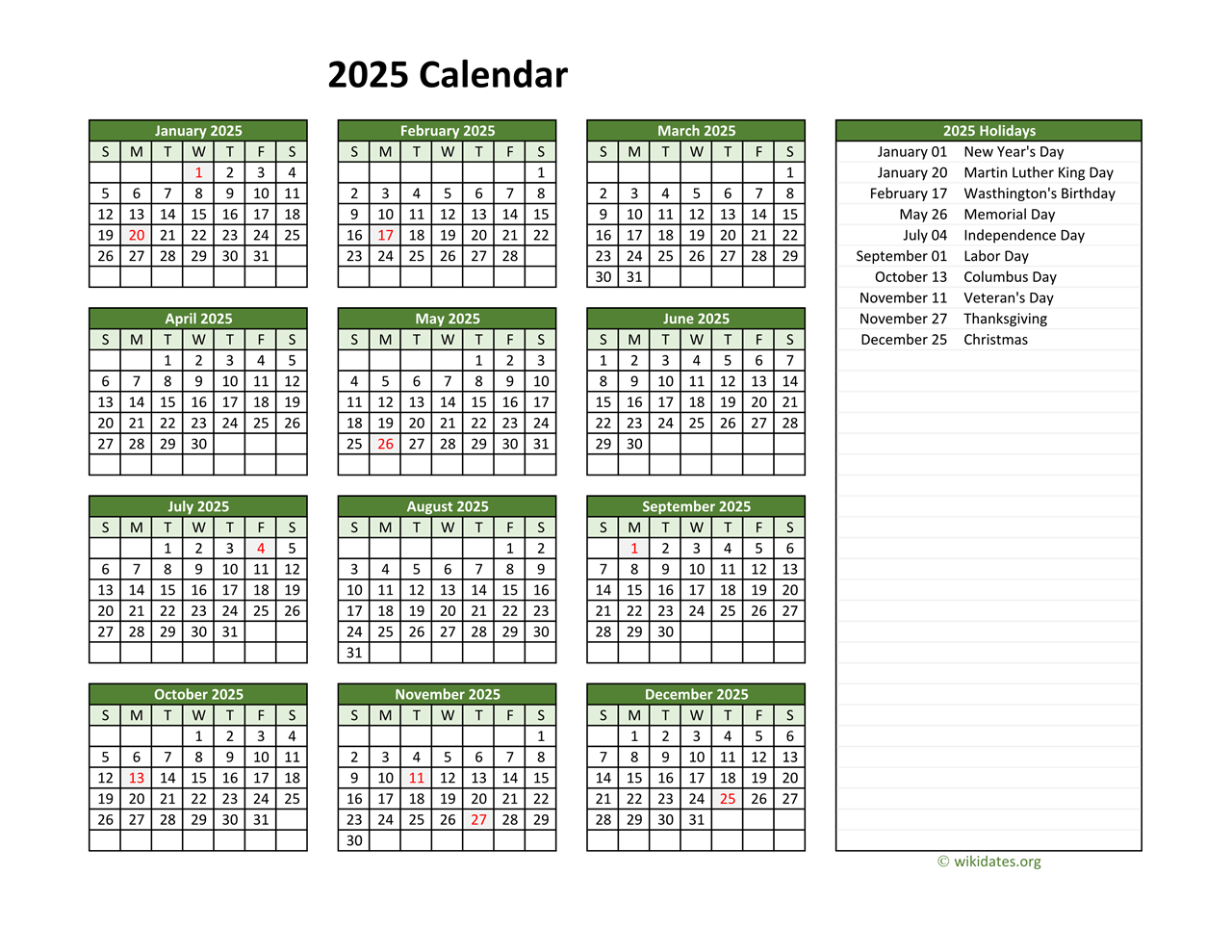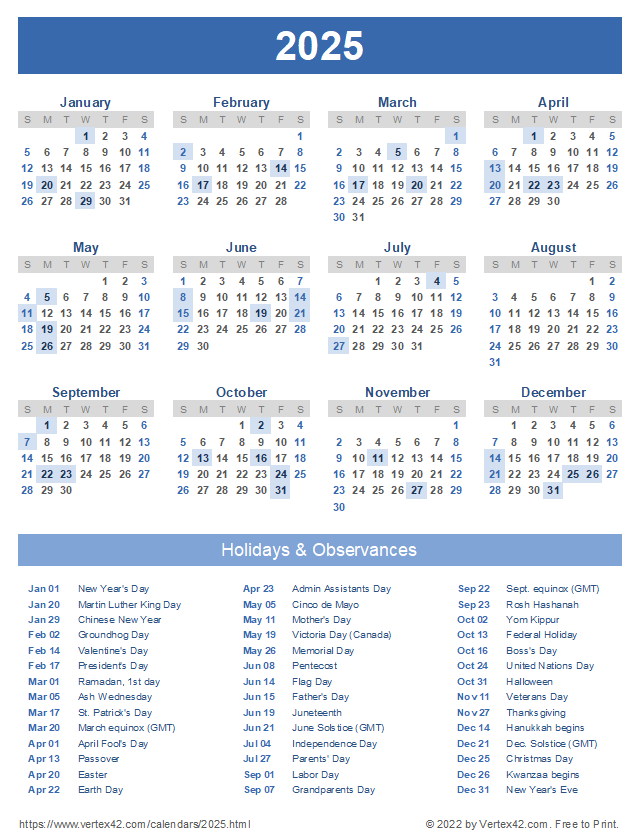Navigating the Federal Holiday Calendar: 2025 Observances and Their Significance
Related Articles: Navigating the Federal Holiday Calendar: 2025 Observances and Their Significance
Introduction
In this auspicious occasion, we are delighted to delve into the intriguing topic related to Navigating the Federal Holiday Calendar: 2025 Observances and Their Significance. Let’s weave interesting information and offer fresh perspectives to the readers.
Table of Content
Navigating the Federal Holiday Calendar: 2025 Observances and Their Significance

The federal holiday calendar serves as a vital guide for federal employees, outlining designated days of observance and providing opportunities for rest, reflection, and commemoration. The Office of Personnel Management (OPM) plays a crucial role in establishing and managing these holidays, ensuring consistency across federal agencies. Understanding the calendar and its implications is essential for both employees and employers within the federal government.
2025 Federal Holidays: A Comprehensive Overview
The year 2025 presents a unique combination of traditional and observed holidays, each carrying its own historical significance and cultural relevance. The following list details the official federal holidays for 2025, along with their respective dates and rationale:
January
- New Year’s Day (Tuesday, January 1st): This holiday marks the beginning of a new year, offering a time for reflection, resolutions, and fresh starts.
February
- Martin Luther King Jr. Day (Monday, January 20th): Commemorating the life and legacy of Dr. Martin Luther King Jr., this holiday celebrates his unwavering commitment to equality and social justice.
May
- Memorial Day (Monday, May 26th): A solemn day dedicated to honoring those who have died while serving in the United States Armed Forces. It is a time for remembrance and gratitude for their sacrifices.
June
- Juneteenth National Independence Day (Friday, June 19th): This holiday marks the emancipation of enslaved African Americans in the United States. It celebrates freedom, resilience, and the ongoing fight for racial justice.
July
- Independence Day (Thursday, July 3rd): Commemorating the signing of the Declaration of Independence, this holiday celebrates the birth of the United States and its commitment to liberty and self-governance.
September
- Labor Day (Monday, September 1st): This holiday honors the contributions and achievements of American workers. It acknowledges the importance of labor unions and the ongoing pursuit of fair labor practices.
October
- Columbus Day (Monday, October 13th): While this holiday remains a point of contention due to its historical complexities, it is officially observed as a day to recognize the contributions of Christopher Columbus and the European exploration of the Americas.
November
-
Veterans Day (Wednesday, November 11th): This holiday honors all veterans of the U.S. Armed Forces, recognizing their service and sacrifices in defending the nation.
-
Thanksgiving Day (Thursday, November 27th): A traditional holiday celebrated with family and friends, Thanksgiving commemorates the harvest and expresses gratitude for blessings received.
December
- Christmas Day (Tuesday, December 25th): A widely celebrated religious holiday, Christmas marks the birth of Jesus Christ and is often associated with family gatherings, gift-giving, and festive traditions.
Understanding the Impact of Federal Holidays
The implementation of federal holidays has a profound impact on the federal workforce and the wider community. These designated days of observance offer numerous benefits, including:
-
Improved Work-Life Balance: Federal holidays provide employees with valuable time to rest, recharge, and spend time with loved ones. This promotes a healthy work-life balance, leading to increased job satisfaction and productivity.
-
Cultural and Historical Preservation: By observing federal holidays, the government acknowledges and celebrates significant historical events, cultural traditions, and the contributions of diverse groups within society. This helps to foster a sense of national identity and shared values.
-
Economic Stimulation: Federal holidays often lead to increased consumer spending, as individuals engage in leisure activities, travel, and shopping. This economic boost can benefit businesses and contribute to overall economic growth.
Navigating the Federal Holiday Calendar: FAQs
Q: How are federal holidays observed in the federal government?
A: Federal employees are typically granted a paid day off on federal holidays. However, specific observance procedures may vary depending on the agency and nature of work. Some agencies may require employees to work on a holiday, with appropriate compensation or time off in lieu.
Q: Are federal holidays observed in the private sector?
A: While federal holidays are not legally binding for private employers, many businesses choose to observe some or all of them, offering employees paid time off or adjusted work schedules.
Q: Can federal employees work on a holiday?
A: In some cases, federal employees may be required to work on a holiday, particularly in essential services or emergency situations. However, they are typically entitled to overtime pay or compensatory time off for working on a holiday.
Q: What happens if a federal holiday falls on a weekend?
A: Typically, federal holidays falling on a weekend are not observed as separate days off. However, some agencies may choose to offer a substitute day off during the week, depending on their specific policies.
Tips for Effective Holiday Management
-
Plan Ahead: Employees and employers should plan for holidays well in advance, ensuring projects are completed, deadlines are met, and work schedules are adjusted accordingly.
-
Communicate Clearly: Clear communication is essential, especially regarding holiday work schedules, leave requests, and any potential disruptions to services.
-
Respect Cultural Diversity: While federal holidays are based on national events, it is important to acknowledge and respect the diverse cultural backgrounds of employees and the communities they serve.
-
Embrace the Spirit of the Holiday: Federal holidays provide an opportunity for reflection, celebration, and community engagement. Embrace the spirit of the holiday by participating in events, volunteering, or simply enjoying time with loved ones.
Conclusion
The federal holiday calendar serves as a vital reminder of the historical events, cultural traditions, and values that shape the United States. It provides a platform for honoring those who have served our nation, celebrating our freedoms, and fostering a sense of community. By understanding the significance of these holidays and their impact on the federal workforce, employees and employers can navigate the calendar effectively, ensuring that both work and personal commitments are appropriately addressed.








Closure
Thus, we hope this article has provided valuable insights into Navigating the Federal Holiday Calendar: 2025 Observances and Their Significance. We appreciate your attention to our article. See you in our next article!
